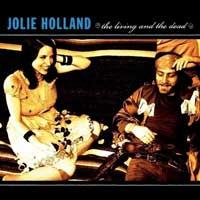Having a unique voice can be a blessing and a curse. Fellow chanteuses Feist and Norah Jones found commercial success in molding jazz vocals with pop music in the past five or so years. Jolie Holland, too, has been gaining quite a following behind her more traditional approach to singing jazz music through the funnel of the indie rock world. But on her new album, The Living and the Dead, Holland strays into the dusty-booted world of late `60s, early `70s folk-tinged singer-songwriter fare, and it seems that the new stylistic approach might not be best suited.
The album features contributions from guitarist Mark Ribot (Tom Waits, Elvis Costello), drummer Rachel Blumberg (M. Ward, Bright Eyes, the Decemberists), and M. Ward himself, who contributed to the arrangements for most of the album and worked alongside producer Shazad Ismaily. Such an all-star cast provides for excellent playing, and Holland's songwriting seems to be in solid form, working laid-back rhythms under interesting chord progressions. The trouble factor here, it would seem, is Holland's world-famous voice.
Draped over lush piano arrangements, Holland's voice flutters like a songbird's should. On album opener "Mexico City," her voice bucks and brays uncontrollably over the song's steady backbeat, plucked electric guitar chords, and soft melody. "Your Big Hands" has M. Ward aping Keith Richard's to the best of his ability, but Holland's voice sounds mushmouthed, like someone is forcing her mouth into an "O" position with rubber bands.
That's not to say the songs aren't well-written or pleasant to listen to -- they're just a bit jarring when they shouldn't be. That's not the case with every track. "Sweet Loving Man," a country ballad, lets Holland eschew twang for her trademark flutter with remarkable results. It's the kind of song you want to play yourself to sleep with. Likewise, on "The Future," Holland's most modern track stylistically, her voice is a boon. "Corrido Por Buddy" and "Palmyra" show a hint of restraint that complements the song's quiet attitude, and "You Painted Yourself In" shows Holland's voice as a gentle instrument paired with only a gently picked guitar. The album itself is a solid collection of well-put together songs, but its falters and missteps stand out.
Artists need room to grow, expand -- according to Cole Porter, "experiment," and breathe new life into their music before it begins to stagnate on them too early in their career. But sometimes formulas are set in place for a reason and more of the same might not be a bad thing. When your voice is your selling point, it might be working against yourself to write songs it might not complement too well. Or, just maybe, it might be time to try to reign it in a little more for consistency's sake.
